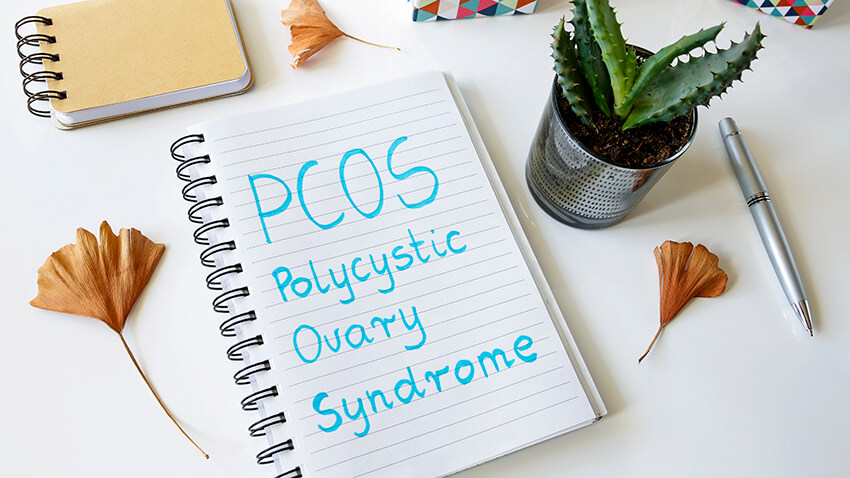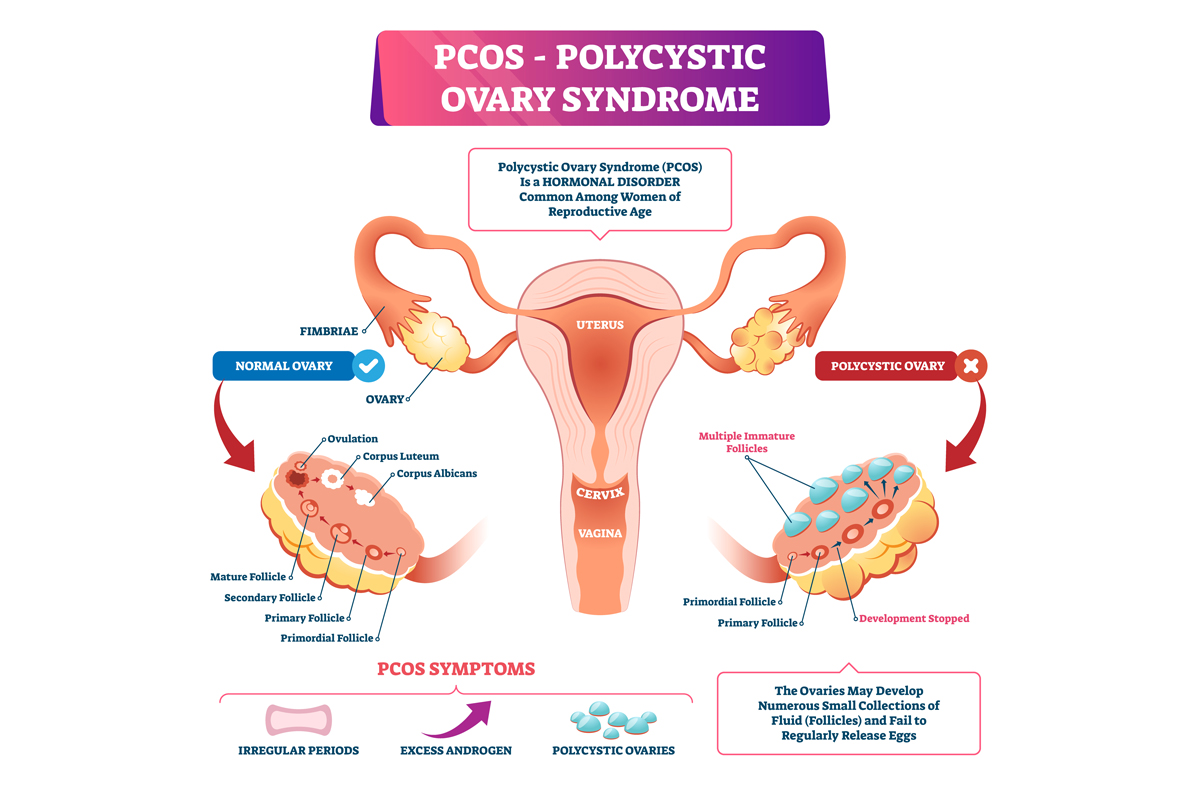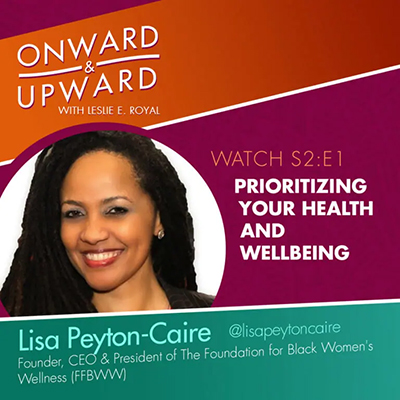Polycystic Ovary Syndrome (PCOS) – Everything You Need to Know Symptoms to Treatment
- What is PCOS?
- PCOS Causes
- Symptoms of PCOS
- Diagnosing PCOS
- Treatment Options for PCOS
- Asymptomatic PCOS
Polycystic Ovary Syndrome or PCOS, is a disease that is becoming more prevalent in women. Studies show that 1 out of 14 women of menstrual age suffers from PCOS at some point in their life.
PCOS is a disease that affects your ovaries. It creates hormonal imbalances that cause weight gain, irregular periods, infertility, and an array of other symptoms.
Thankfully, treatment for PCOS is available.
What is PCOS?
PCOS causes the ovaries to produce multiple fluid-filled sacs on or around the ovaries. These sacs are what we commonly call ovarian cysts. PCOS cysts have a thick wall, making it difficult for the ovaries to release eggs (ovulation). Because of this, ovulation may not occur every 28 days as it should; it takes longer. You notice this as irregular periods.
For instance, the usual number of times most women ovulate in a year is twelve times. Which is the equivalent of once every month. However, if you have PCOS, you will ovulate fewer than 12 times in a year. You will have missed periods. These irregularities make it more difficult to get pregnant or regulate hormone levels.
What Causes PCOS?
The cause of PCOS is not known precisely. We know that PCOS occurs more often in women who are overweight, obese, and those with a PCOS family history.
High Levels of Androgen (Male Hormone) Can Cause Polycystic Ovary Syndrome
Another common feature of PCOS is the presence of high levels of male hormones in women. These male hormones are called androgens. Androgens are hormones that are at high levels in men. Women have low levels of androgens. In women with PCOS, the androgen levels tend to be slightly higher than normal.
Your doctor can check your androgen levels through a blood test. However, testing your blood is rarely necessary because women with high androgen levels have certain physical features. High androgen levels may cause acne and excessive unwanted hair growth, especially facial hair. Excessive facial hair in women is called hirsutism (pronounced: her-shoe-tism). Excess facial hair may manifest as thickened mustache, hair along the chin, sideburns, hair between the breasts and less commonly, the lower back.
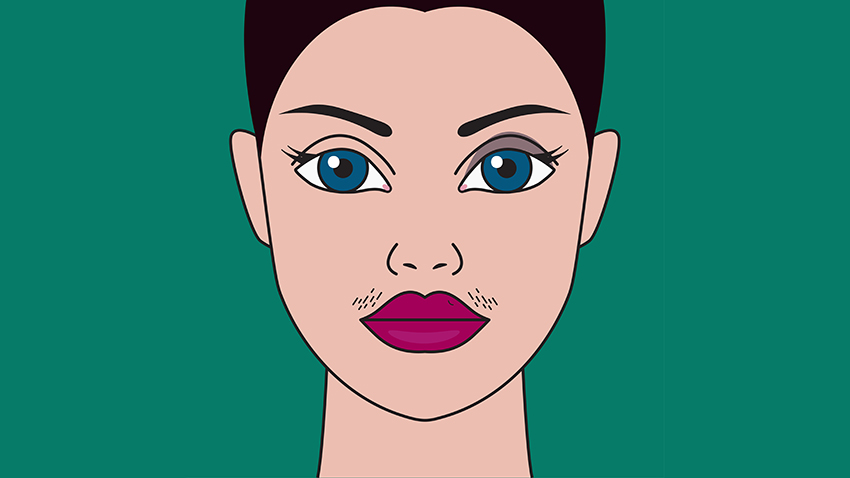
Hirsutism- unwanted facial hair
What are PCOS Symptoms?

There are a variety of symptoms for Polycystic Ovary Syndrome that are easily spotted, including:
- Menstrual Irregularities- menses may occur sporadically, and when they do occur, they may be heavy.
- Weight gain or difficulty losing weight. Especially weight gain around the waist.
- Unwanted Hair growth: face, stomach, back, or chest.
- Acne: Facial or full body. Especially new onset in adulthood.
- Dark Spots: Appear under the arms, on the neck, and under the breast.
- Infertility: Difficulty getting pregnant.
- Diabetes or Insulin Resistance(pre-diabetes): Problems when your body does not produce enough insulin to regulate your blood sugar levels.
How is PCOS Diagnosed?
There are three criteria that must be met for a PCOS diagnosis. The first is ovulatory dysfunction. This is just a fancy way of saying your periods must be irregular. The second is the presence of cysts on your ovaries. This can be seen with a pelvic ultrasound. The third criteria are signs of excess male hormones. This may manifest as excess body hair or acne.
While menstrual irregularity is a common symptom of PCOS, it is not the reason most women seek medical attention. Most women are diagnosed with PCOS in their 20’s or 30s’ when they experience difficulty getting pregnant. For this reason, a woman with PCOS may go undiagnosed for long periods. Delaying the diagnosis of Polycystic Ovary Syndrome causes women to live with a condition that is treatable; and where treatment can lead to an improved quality of life.
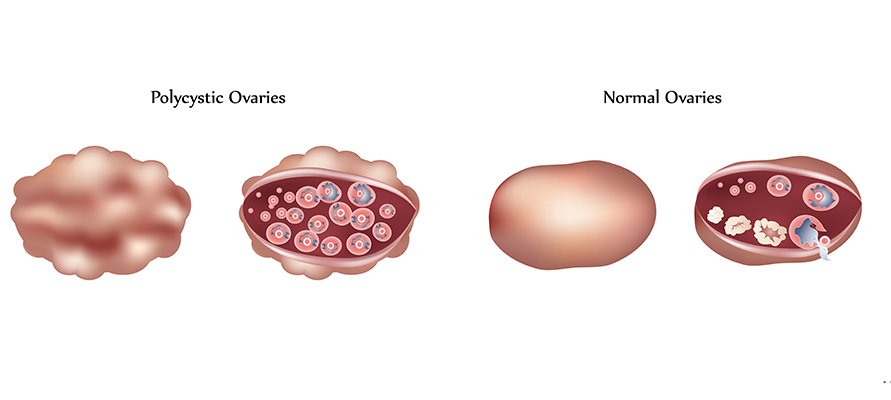
Treatment Options for PCOS
Your treatment will depend on your primary symptom and your goal of therapy. Treatment will depend on whether or not you would like to become pregnant. One treatment that is common, irrespective of your pregnancy desires, is weight loss. Even a modest decrease in weight can improve ovarian function and decrease your risk of developing diabetes.
Women Avoiding Pregnancy
Treatment helps to regulate your menses and reduce the risk of developing diabetes.
- Oral Contraceptive Pills/Birth Control Pills: Regulates menstrual cycles and decreases excessive unwanted hair.
- Progesterone: Regulates periods.
- Insulin Sensitizing Agent: Medications, like Metformin, help reduce diabetes risk and regulate insulin levels.
- Weight Loss/Lifestyle Modification: Helps improve metabolism and weight loss.
Women Pursuing Pregnancy
Treatment helps to increase ovulation.
- Weight Loss/Lifestyle Modification: Increased physical activity and a well-balanced diet help promote a healthy weight. Even a 5-10% drop in weight can improve ovarian function.
- Letrozole (Femara) or Clomiphene Citrate (Clomid): both of these medications increase ovarian egg release (ovulation). But studies suggest Femara has better success rates in PCOS.
- Insulin Sensitizing Agent: Metformin helps to regulate insulin levels and decrease your diabetes risk.
- In-Vitro Fertilization (IVF): Some couples will need more help in becoming pregnant. Assisted reproduction through IVF offers more in-depth testing and treatment.
Long-Term Effects
Whether you want to become pregnant or not, treating PCOS is vital to your health. Not just your reproductive health but the health of your entire body. Long-term risks of untreated PCOS can be serious.
Long Term Risks of Polycystic Ovary Syndrome:
- Endometrial cancer: During menses, the uterus sheds the endometrium, which is the uterus lining. If your endometrial lining keeps building, this can cause vaginal hemorrhage and anemia. When the uterine lining builds up over years and years, the cells can transform into endometrial cancer.
- Diabetes
- Heart disease
Asymptomatic PCOS
So, the question is, for those women who aren’t bothered by missed periods and have no desire to become pregnant. Is it still necessary to treat your PCOS? – YES!
Long-term risks associated with untreated PCOS include the development of endometrial cancer, diabetes, and heart disease. The process of menstruation causes the well-needed shedding of the uterine lining. When menstruation fails to occur regularly, the risk of endometrial cancer increases. The metabolic changes that occur with PCOS increase your risk of diabetes and heart disease. Irrespective of your desire for pregnancy, PCOS can and should be treated.
Written by: myObMD team, Editor: Dayna Smith MD, Reviewed: June 30, 2020
Copyright: myObMD 2020
References
- The American College of Obstetricians and Gynecologists (ACOG), Polycystic Ovary Syndrome, Practice Bulletin Number 194, June 2018
- McCartney, Christopher MD, Marshall, John, C. M.B., Ch.B., M.D.
- S. Department of Health & Human Services, Office on Women’s Health, womenshealth.gov

